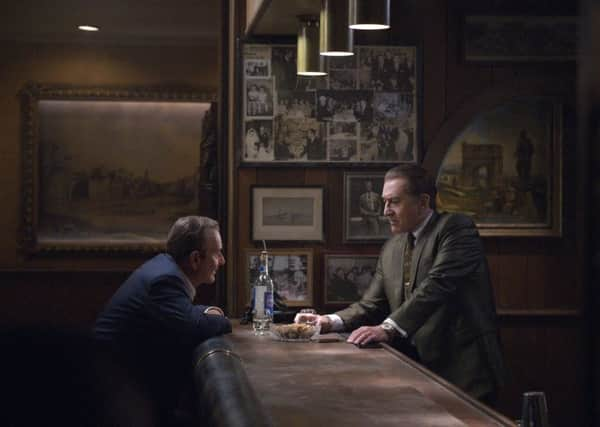Film reviews: The Irishman | The Aeronauts | Meeting Gorbachev


The Irishman (15) ****
The Aeronauts (PG) **
Meeting Gorbachev (PG) ***
Like the digitally de-aged visages of Robert De Niro and Al Pacino that occupy so much of the screen time in Martin Scorsese’s The Irishman, the movie itself is one in which surface vitality is bolstered by the lifetime of experience informing it. Returning to the gangster genre he redefined with Goodfellas nearly 30 years ago, American cinema’s most revered filmmaker (unless you’re a Marvel super-fan that is) has made a tightly constructed epic that drills down into the life of De Niro’s character, mafia hitman Frank Sheeran, as a way of chronicling criminality’s reach into the corridors of power amid the political turmoil of mid-20th-century America.
Intimately bound up with the disappearance of infamous union boss Jimmy Hoffa (Pacino), Frank’s story is told in retrospect as he runs out the clock in a Philadelphia nursing home. An old shnook confronting the existential despair that comes from exceeding your life expectancy, his memories drift back and forth through a heady time in which we see him rise from war veteran to on-the-make truck driver to contract killer for the mob, a job euphemistically described in terms of painting houses, something Scorsese duly illustrates with an abstract shot of blood decorating a wall like a grisly Jackson Pollock. Frank’s ascent reaches its apotheosis when his boss and best friend, Philadelphia mobster Russell Bufalino (Joe Pesci), assigns him to protect Jimmy Hoffa, a politician whose iron-fisted control of the Teamsters makes him a useful ally. In turn, Hoffa gives Frank a Zelig-like seat at the table of history, his various assignments apparently putting him in the orbit of the Bay of Pigs, the Kennedy assassinations and Watergate, speculative details in Sheeran’s biography that Scorsese and screenwriter Steve Zaillian weave into a critique of the corruption forever ripping holes in the fabric of American life.
Advertisement
Hide AdWith three-and-a-half hours of screen time to play with, though, Scorsese also gives plenty of space to the fascinating intricacies of Frank’s friendship with both of these men, his diverging loyalties complicated by his own daughter Peggy’s (Anna Paquin) affection for the charismatic Hoffa over the quietly sinister Russell. It’s certainly a joy to see De Niro re-teaming with Pacino here. Ditto the out-of-retirement Pesci. And Scorsese (working with Pacino for the first time) fairly revels in the opportunities such pairings afford him, especially as he dials down the intoxicating stylistic flourishes of his earlier forays into this world. The film’s best scene, for instance, is the relatively quiet one of Frank and Jimmy sharing a hotel room on the road. Shooting the breeze in their pyjamas as they settle down for the night, Scorsese’s camera subtly alights on Frank instinctively placing his gun next to his watch on the night-stand – a potent symbol of this movie’s fascination with the passage of time in a violent world.
Indeed, through the film Scorsese de-glamourises the life, riffing on his menacing final shot in Goodfellas (itself a riff on the final shot in Edwin S Porter’s The Great Train Robbery) by introducing anyone connected to the life, however minor, with subtitled details of the grizzly end they’ll eventually meet. It’s a stylistic detail that also harks back to the freeze-framed character intros in Scorsese’s break-out film Mean Streets. In that film, his characters didn’t make up for their sins in the church, they did it on the streets. In The Irishman, Scorsese has reached an age where he understands there’s no making up for these sins at all: you just get whacked when you least expect it or live out your days like Frank – sad, old and inescapably alone.
The Aeronauts sees Felicity Jones and Eddie Redmayne follow up their partnership in The Theory of Everything with another drearily rendered true story with a scientific bent. Make that true-ish story: despite being built around the very real efforts of Victorian meteorologist James Glaisher (Redmayne) to prove that weather prediction was possible, the film uses Glaisher’s achievements as a jumping off point to explore Jones’s character, Amelia Wren, a fictional balloonist conceived as a plucky, science-loving, proto-feminist whose force-of-nature disposition is a thigh slap away from a panto season in the West End. Directed by Tom Harper (Wild Rose), the film cuts between their attempt to go higher than anyone has ever flown before and lots of flashbacks outlining the societal contempt each has had to overcome. Notwithstanding the odd bit of CGI-enhanced derring do on top of a balloon, the film has a very Sunday night TV feel, not helped by the fact that we spend most of it watching Jones and Redmayne shivering in a basket.
Co-directed by Werner Herzog, Meeting Gorbachev finds the German interlocutor on less self-parodic form than he has been of late – a choice that perhaps reflects the respect he accords the last president of the Soviet Union. The timing is fascinating too; the man who ended the Cold War before being ousted from power is regarded now as something of a traitor in Russia, yet as comes through in the film, his optimistic brand of intelligent and pragmatic statesmanship is precisely what the world needs to halt its current backwards slide into ego-centric demagoguery. Running through Gorbachev’s life story and the seismic political changes he oversaw, Herzog frames him as a tragic figure whose decency and genuineness was his undoing – a pretty bleak but necessary reminder of how easily good work can be reversed. ■